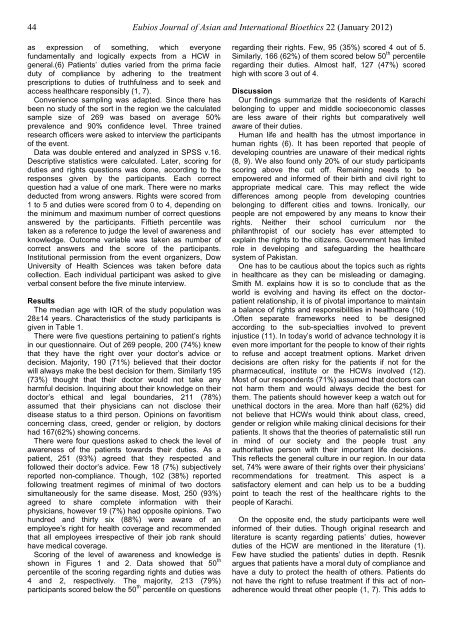Eubios Journal of Asian and International Bioethics - Eubios Ethics ...
Eubios Journal of Asian and International Bioethics - Eubios Ethics ...
Eubios Journal of Asian and International Bioethics - Eubios Ethics ...
You also want an ePaper? Increase the reach of your titles
YUMPU automatically turns print PDFs into web optimized ePapers that Google loves.
44 <strong>Eubios</strong> <strong>Journal</strong> <strong>of</strong> <strong>Asian</strong> <strong>and</strong> <strong>International</strong> <strong>Bioethics</strong> 22 (January 2012)<br />
as expression <strong>of</strong> something, which everyone<br />
fundamentally <strong>and</strong> logically expects from a HCW in<br />
general.(6) Patients’ duties varied from the prima facie<br />
duty <strong>of</strong> compliance by adhering to the treatment<br />
prescriptions to duties <strong>of</strong> truthfulness <strong>and</strong> to seek <strong>and</strong><br />
access healthcare responsibly (1, 7).<br />
Convenience sampling was adapted. Since there has<br />
been no study <strong>of</strong> the sort in the region we the calculated<br />
sample size <strong>of</strong> 269 was based on average 50%<br />
prevalence <strong>and</strong> 90% confidence level. Three trained<br />
research <strong>of</strong>ficers were asked to interview the participants<br />
<strong>of</strong> the event.<br />
Data was double entered <strong>and</strong> analyzed in SPSS v.16.<br />
Descriptive statistics were calculated. Later, scoring for<br />
duties <strong>and</strong> rights questions was done, according to the<br />
responses given by the participants. Each correct<br />
question had a value <strong>of</strong> one mark. There were no marks<br />
deducted from wrong answers. Rights were scored from<br />
1 to 5 <strong>and</strong> duties were scored from 0 to 4, depending on<br />
the minimum <strong>and</strong> maximum number <strong>of</strong> correct questions<br />
answered by the participants. Fiftieth percentile was<br />
taken as a reference to judge the level <strong>of</strong> awareness <strong>and</strong><br />
knowledge. Outcome variable was taken as number <strong>of</strong><br />
correct answers <strong>and</strong> the score <strong>of</strong> the participants.<br />
Institutional permission from the event organizers, Dow<br />
University <strong>of</strong> Health Sciences was taken before data<br />
collection. Each individual participant was asked to give<br />
verbal consent before the five minute interview.<br />
Results<br />
The median age with IQR <strong>of</strong> the study population was<br />
28±14 years. Characteristics <strong>of</strong> the study participants is<br />
given in Table 1.<br />
There were five questions pertaining to patient’s rights<br />
in our questionnaire. Out <strong>of</strong> 269 people, 200 (74%) knew<br />
that they have the right over your doctor’s advice or<br />
decision. Majority, 190 (71%) believed that their doctor<br />
will always make the best decision for them. Similarly 195<br />
(73%) thought that their doctor would not take any<br />
harmful decision. Inquiring about their knowledge on their<br />
doctor’s ethical <strong>and</strong> legal boundaries, 211 (78%)<br />
assumed that their physicians can not disclose their<br />
disease status to a third person. Opinions on favoritism<br />
concerning class, creed, gender or religion, by doctors<br />
had 167(62%) showing concerns.<br />
There were four questions asked to check the level <strong>of</strong><br />
awareness <strong>of</strong> the patients towards their duties. As a<br />
patient, 251 (93%) agreed that they respected <strong>and</strong><br />
followed their doctor’s advice. Few 18 (7%) subjectively<br />
reported non-compliance. Though, 102 (38%) reported<br />
following treatment regimes <strong>of</strong> minimal <strong>of</strong> two doctors<br />
simultaneously for the same disease. Most, 250 (93%)<br />
agreed to share complete information with their<br />
physicians, however 19 (7%) had opposite opinions. Two<br />
hundred <strong>and</strong> thirty six (88%) were aware <strong>of</strong> an<br />
employee’s right for health coverage <strong>and</strong> recommended<br />
that all employees irrespective <strong>of</strong> their job rank should<br />
have medical coverage.<br />
Scoring <strong>of</strong> the level <strong>of</strong> awareness <strong>and</strong> knowledge is<br />
shown in Figures 1 <strong>and</strong> 2. Data showed that 50 th<br />
percentile <strong>of</strong> the scoring regarding rights <strong>and</strong> duties was<br />
4 <strong>and</strong> 2, respectively. The majority, 213 (79%)<br />
participants scored below the 50 th percentile on questions<br />
regarding their rights. Few, 95 (35%) scored 4 out <strong>of</strong> 5.<br />
Similarly, 166 (62%) <strong>of</strong> them scored below 50 th percentile<br />
regarding their duties. Almost half, 127 (47%) scored<br />
high with score 3 out <strong>of</strong> 4.<br />
Discussion<br />
Our findings summarize that the residents <strong>of</strong> Karachi<br />
belonging to upper <strong>and</strong> middle socioeconomic classes<br />
are less aware <strong>of</strong> their rights but comparatively well<br />
aware <strong>of</strong> their duties.<br />
Human life <strong>and</strong> health has the utmost importance in<br />
human rights (6). It has been reported that people <strong>of</strong><br />
developing countries are unaware <strong>of</strong> their medical rights<br />
(8, 9). We also found only 20% <strong>of</strong> our study participants<br />
scoring above the cut <strong>of</strong>f. Remaining needs to be<br />
empowered <strong>and</strong> informed <strong>of</strong> their birth <strong>and</strong> civil right to<br />
appropriate medical care. This may reflect the wide<br />
differences among people from developing countries<br />
belonging to different cities <strong>and</strong> towns. Ironically, our<br />
people are not empowered by any means to know their<br />
rights. Neither their school curriculum nor the<br />
philanthropist <strong>of</strong> our society has ever attempted to<br />
explain the rights to the citizens. Government has limited<br />
role in developing <strong>and</strong> safeguarding the healthcare<br />
system <strong>of</strong> Pakistan.<br />
One has to be cautious about the topics such as rights<br />
in healthcare as they can be misleading or damaging.<br />
Smith M. explains how it is so to conclude that as the<br />
world is evolving <strong>and</strong> having its effect on the doctorpatient<br />
relationship, it is <strong>of</strong> pivotal importance to maintain<br />
a balance <strong>of</strong> rights <strong>and</strong> responsibilities in healthcare (10)<br />
.Often separate frameworks need to be designed<br />
according to the sub-specialties involved to prevent<br />
injustice (11). In today’s world <strong>of</strong> advance technology it is<br />
even more important for the people to know <strong>of</strong> their rights<br />
to refuse <strong>and</strong> accept treatment options. Market driven<br />
decisions are <strong>of</strong>ten risky for the patients if not for the<br />
pharmaceutical, institute or the HCWs involved (12).<br />
Most <strong>of</strong> our respondents (71%) assumed that doctors can<br />
not harm them <strong>and</strong> would always decide the best for<br />
them. The patients should however keep a watch out for<br />
unethical doctors in the area. More than half (62%) did<br />
not believe that HCWs would think about class, creed,<br />
gender or religion while making clinical decisions for their<br />
patients. It shows that the theories <strong>of</strong> paternalistic still run<br />
in mind <strong>of</strong> our society <strong>and</strong> the people trust any<br />
authoritative person with their important life decisions.<br />
This reflects the general culture in our region. In our data<br />
set, 74% were aware <strong>of</strong> their rights over their physicians’<br />
recommendations for treatment. This aspect is a<br />
satisfactory element <strong>and</strong> can help us to be a budding<br />
point to teach the rest <strong>of</strong> the healthcare rights to the<br />
people <strong>of</strong> Karachi.<br />
On the opposite end, the study participants were well<br />
informed <strong>of</strong> their duties. Though original research <strong>and</strong><br />
literature is scanty regarding patients’ duties, however<br />
duties <strong>of</strong> the HCW are mentioned in the literature (1).<br />
Few have studied the patients’ duties in depth. Resnik<br />
argues that patients have a moral duty <strong>of</strong> compliance <strong>and</strong><br />
have a duty to protect the health <strong>of</strong> others. Patients do<br />
not have the right to refuse treatment if this act <strong>of</strong> nonadherence<br />
would threat other people (1, 7). This adds to

















